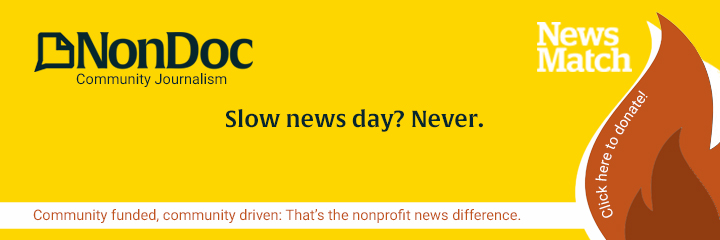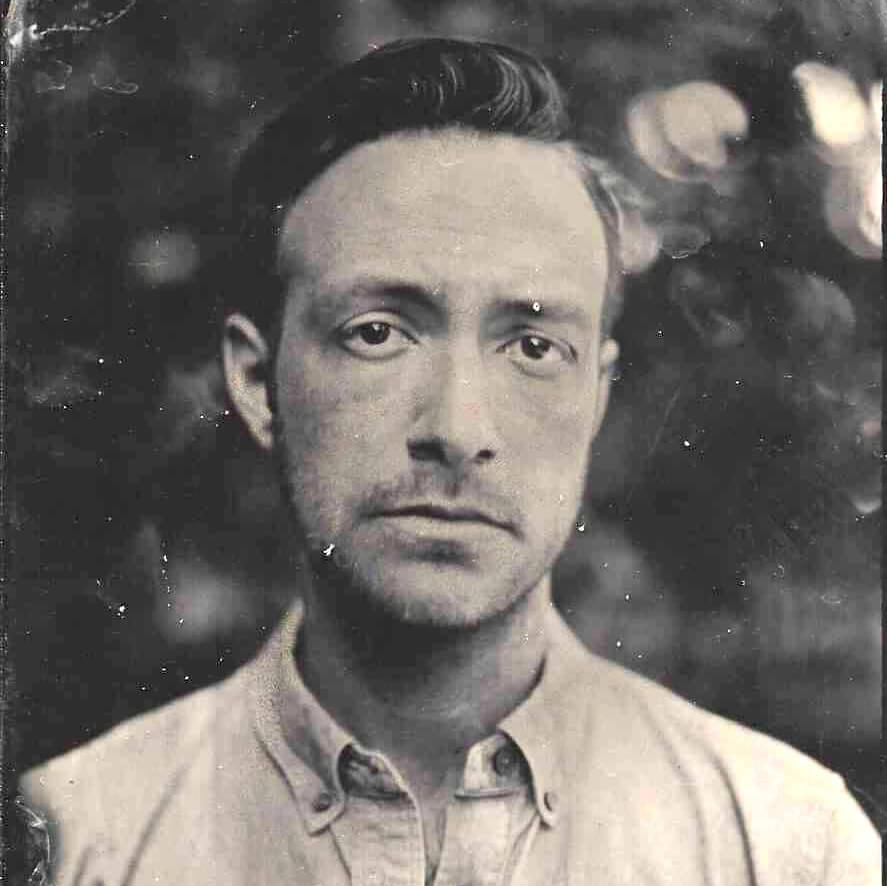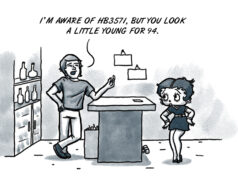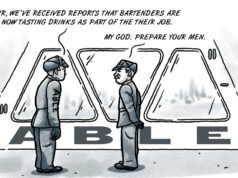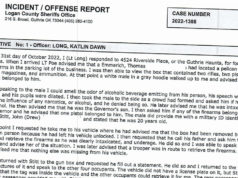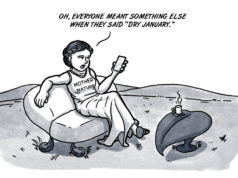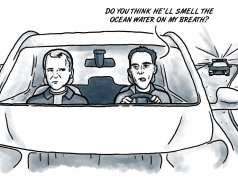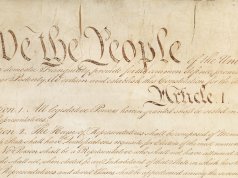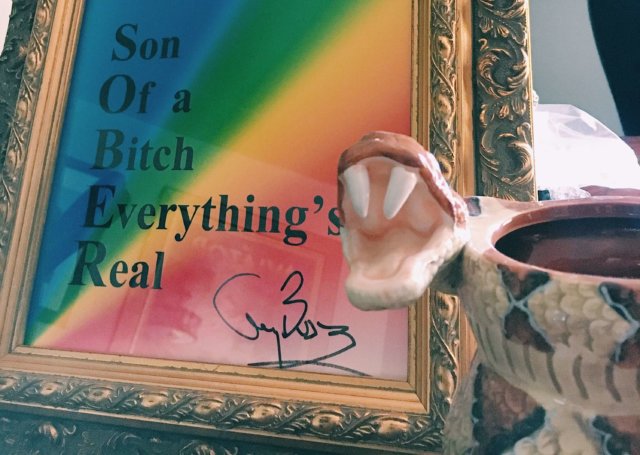
I had my first drink during the summer of 2006, following my freshman year of college. Before that, I had always been a shy, melancholy guy. Sure, I could be artistic and extroverted in certain situations — acting being a prime example. In these “controlled” scenarios, I could safely express myself, but put me in a social situation with a group of people, big or small, and I might as well not even be there. A party? That’s a nightmare for someone like me.
Alcohol changed that. All of a sudden, I was witty, smart, I had ideas. I was having “fun.” I was as charming and interesting as I had always wanted to be.
In actuality, though, I wasn’t. Alcohol is, as Larry David would say, “pretty, pretty, pretty, pretty, pretty good” at establishing a mutual-admiration society, both within yourself and between you and your fellow drinking partners. It temporarily patches all those shitty holes inside yourself like the work of a contractor in a cheap housing addition. Rick James once said, “Cocaine is a hell of a drug.” Well, so is alcohol.
For those of you dear readers who need a visual aid, imagine it like this: When I was sober in a social setting, I was like Stephen Root‘s character Milton from Office Space, muttering to myself, looking for my stapler. (Which, now that I think about it, was probably subconsciously a metaphor for the penis.)
When I was drinking in a social setting, however, I was more like Jack Nicholson‘s character Buddusky from 1973’s The Last Detail, slamming my .45 pistol on the bar top and loudly proclaiming, “I am the motherfucking shore patrol, motherfucker! I am the motherfucking shore patrol! Now, give this man a beer.” (The gun was, I realize now, probably another subconscious reference to the penis.)
The bottle began drinking me
Two years passed. With the help of alcohol, I gained more friends. I also gained an extra 30 to 40 pounds. It was at this point I ceased to drink the bottle. It began drinking me.
Class presentations were given drunk. I was never great at Spanish, but one day in particular, I would’ve made President Donald Trump look like a human Rosetta Stone course. One day during an internship, I was so hungover and still intoxicated from the night before that I spent almost eight hours curled up and passed out in an editing booth. Days spent at apartment pools, emptying 38-quart ice chests full of beer by myself, passing out on pool chairs, enduring sun damage I’m still paying for and being asked to leave after belligerently berating water volleyball players were how I filled my summer days. Torturing my poor ex-girlfriend by vomiting and inconsolably crying at the use of the Smashing Pumpkins’ The Beginning Is The End Is The Beginning in the trailer for Watchmen is how I spent my summer nights. You know, completely sane and socially acceptable behavior …
Broken blood vessels in my eyes – the result of violent vomiting and dry-heaving – was unfortunate. Evenings throwing up blood into a bathtub was bad. Waking up in my bed, having no idea how I had gotten there, was worse.
‘Everybody having a good time except you’
My alcoholism – which had started by making me the life of the party, or, at the very least, alive at the party – now made me resemble the line, “We ate the food, we drank the wine. Everybody having a good time except you. You were talking about the end of the world,” from Patti Smith’s Until the End of the World. (Side note: I know Until the End of the World was originated by U2, but, come on, I think we can all agree Patti Smith is way cooler than U2, AND her cover is far superior, hence I cited her first.)
I was a bad roommate. I was a bad friend. I was a bad boyfriend. I was a bad person. I was treating myself poorly. More importantly, I was treating others poorly. Friends, lovers, people who deserved far better.
I didn’t graduate on time. Can’t imagine why that was. Sadly, the fun didn’t end there. Days full of Four Loko culminated in unintelligible phone calls to friends. I would endlessly sob over my mental images of rock stars who had died of drug addiction. More days, months and years like this continued. Soon, every time I got drunk, I blacked out.
Real pain with champagne
Tom Waits has been attributed as saying, “Champagne for my real friends, real pain for my sham friends.” Well, in my case, my sham friend (alcohol) tried to give me real pain with champagne. Or take away my pain, which is how I saw it at the time.
I was living in L.A., and one normal afternoon I came home from a brunch full of mimosas. I was in the middle of a shower I’d hoped would help even things out when an epiphany popped into my head (or, as Smee from 1991’s Hook would incorrectly identify it, an apostrophe): If you’re medicating yourself for all this pain and you can’t seem to stop it, why not get rid of it all together? Tear it out from the root. Why not just kill yourself? This line of thinking was something familiar to me.
For whatever reason, I didn’t follow through with this brilliant idea, most likely because I didn’t want to make someone responsible for my dead body. I also didn’t stop drinking. I did, however, start fighting the urge to drink until finally, one sunny autumn day, I realized a month had passed since the last time I had drank. This realization ultimately had a negative effect because it made me want drink that much more — and I would have had it not been for an old college friend, a woman I’d used to drink with from time to time.
Mobile app saves millennial man (seriously)
My friend had posted about her sobriety through a phone app called NOMO. This app functions as a way to hold yourself accountable for a habit, addiction or anything negative you’re trying to overcome. It tracks your progress, checks in with you and can allow you to send out “SOS” messages to partners in your network for feedback when you’re struggling and need encouragement. I immediately messaged her and asked her what it was all about. She was happier. She was healthier. She was making it work. I figured, what did I have to lose? So I downloaded it.
Now, I know what you’re thinking: “Man, millennials can’t even get sober without using an app.” First of all, that’s a cliché joke I would make. In fact, I just made it. Second of all, here’s a knock knock joke for you.
This is going to sound silly to some, but ever since I downloaded that app, I’ve been clean and sober. Rain or shine. Make no mistake, however, it’s a daily struggle. The app hasn’t done it all, of course. I’ve white-knuckled my way through more dry days than I care to admit or remember. And I still do.
Still, over time, I’ve developed a healthier lifestyle. Directing my addictive personality elsewhere has been a huge key. Funneling energy and attention into work and exercise is an infinite sobriety feedback loop for me. Using all my energy in workouts and pushing professionally to achieve career goals leaves little time for sitting around, which means less time to think about drinking, which means not drinking, which means being healthy and clear-headed enough to work out and push professionally to achieve career goals.
Last but not least, the exponential love and support of my wife is without a doubt the biggest factor for me maintaining my sobriety. You can’t really undersell unconditional love — especially when (at least in my case) you probably don’t deserve it. I’ve done my fair share of letting her down, but she’s always been there. Like a rock. But, like, a beautiful rock. A rock so beautiful, so intelligent, that it doesn’t even look like a rock. It looks like my beautiful wife. Because it is.
SOBER: Just the way I like it
That old friend who introduced the app to me continues to be an inspiration, as well. On one occasion she posted about a sobriety gift she received from a close friend. It was a signed anagram by none other than Oklahoma’s own Gary Busey, addressed to her.
Now, if you know anything about Mr. Busey, you know he’s a big fan of anagrams, or Buseyisms as they’ve been termed. You could even say he’s an anagram savant. The anagram my friend received was succinct, hilarious and bluntly accurate in describing sobriety, or at least sobriety as I’ve experienced it. I researched the piece and soon found that Mr. Busey had an entire portion of his website dedicated to selling musings such as these. For a price, you can have him autograph them for you, too.
I wasted no time in performing my consumerist duty, and now I am the proud owner of the same piece of perspective. It sits prominently on my office desk. The components of the anagram spell the word SOBER. It reads, “Son Of a Bitch Everything’s Real,” and I’ve finally reached the point in my life where that’s just the way I like it.








